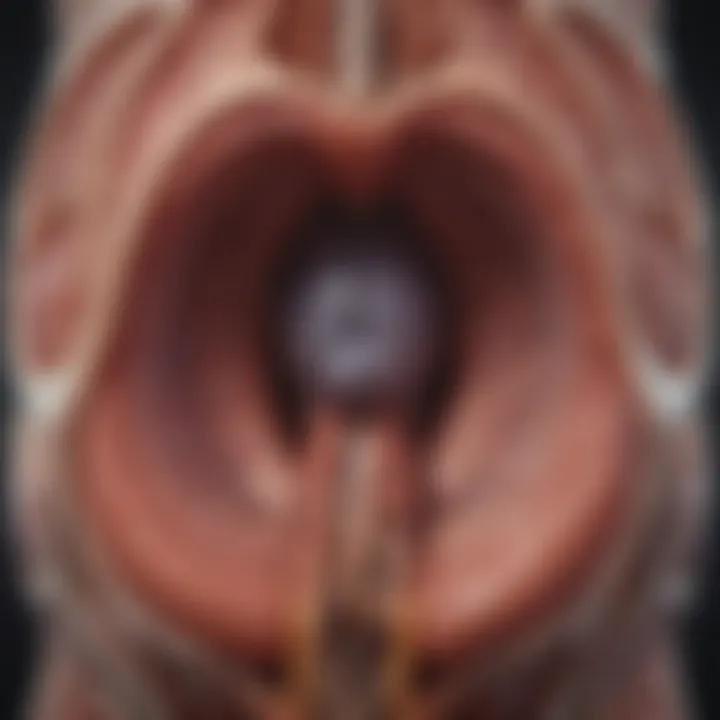Exploring Alternatives: Healing Bladder Infections Naturally


Intro
Bladder infections, medically known as cystitis, are common yet often underappreciated health issues. A large segment of the population experience these infections, primarily affecting women. Traditional treatments have largely focused on antibiotics, but there is a growing interest in exploring alternative methods for healing bladder infections. This increasing awareness has opened up a discussion surrounding natural remedies, lifestyle adjustments, and a deeper understanding of the underlying causes of these infections.
The purpose of this article is to examine non-antibiotic approaches to treating bladder infections. By investigating various natural therapies and prevention strategies, we aim to provide a comprehensive guide for individuals seeking alternatives that could also enhance overall bladder health.
Research Overview
When delving into alternatives for bladder infections, it is crucial to understand the research background. Scientific studies analyze the effectiveness of natural remedies and lifestyle changes. This research aids in distinguishing between what is anecdotal and what is supported by empirical evidence.
Methodological Approaches
The research methodologies employed often include randomized controlled trials, observational studies, and surveys that explore participant experiences with bladder infections and treatment. These approaches allow for a more thorough analysis of the safety and efficacy of non-antibiotic treatments. For example, a study might assess the impact of increasing fluid intake on infection recurrence rates.
Significance and Implications
Understanding the significance of such research is vital. It allows healthcare professionals and patients alike to make informed decisions regarding treatment options. Non-antibiotic approaches may offer safer, effective solutions for individuals concerned about antibiotic resistance or frequent reliance on pharmaceuticals. The implications are far-reaching, potentially improving the quality of life for many who suffer from recurrent bladder infections.
Current Trends in Science
Research is continuously evolving, bringing forth new insights into bladder health and infection treatment alternatives. This section highlights current trends within this field that contribute to our understanding and knowledge.
Innovative Techniques and Tools
Recent advances in medical science have introduced innovative methods for diagnosing and treating bladder infections without the use of antibiotics. Techniques such as probiotics use are gaining traction, as evidence mounts regarding their potential benefits in maintaining urinary tract health.
These tools also extend to digital health applications that track symptoms and treatment responses, providing valuable data for both patients and researchers.
Interdisciplinary Connections
The exploration of healing bladder infections is not confined to one field of study. It bridges disciplines, encompassing areas such as microbiology, nutrition, and holistic health practices. This interdisciplinary synergy fosters a greater understanding of health maintenance and disease prevention.
This evolving understanding highlights the need for a combined approach when treating bladder infections, integrating different methodologies and perspectives.
The synthesis of information gathered through research, innovative treatment methods, and cross-disciplinary insights paints a comprehensive picture of how individuals can effectively manage bladder infections without antibiotics. Through this exploration, we hope to inspire further inquiry and foster a culture of informed health decisions.
Prelims to Bladder Infections
Bladder infections, commonly referred to as urinary tract infections (UTIs), are an important health issue that affects millions of individuals every year. Understanding bladder infections is necessary, particularly in today’s context where antibiotic resistance is a growing concern. The focus of this article is to present alternatives for healing bladder infections without relying on antibiotics.
Addressing bladder infections involves a multidimensional approach that includes recognizing symptoms, understanding the underlying causes, and exploring various healing strategies. This article will delve into natural remedies and lifestyle changes, providing a comprehensive guide to managing bladder health effectively.
Definition and Overview
A bladder infection occurs when bacteria enter the urinary tract and multiply in the bladder. This infection can lead to inflammation and discomfort. UTIs are primarily caused by bacteria such as Escherichia coli, which are normally present in the intestines. An overview of bladder infections reveals a condition that can be acute or recurrent, affecting women more frequently than men due to anatomical differences.
Effective management requires prompts recognition of symptoms such as frequent urination, burning sensation during urination, and abdominal pain. By understanding what bladder infections are, individuals can take informed steps towards preventing and treating them.
Prevalence and Impact
Bladder infections are among the most common infections, especially in women, with studies indicating that about 50-60% of women will experience at least one UTI in their lifetime. The impact extends beyond just physical discomfort. It can lead to significant healthcare costs and reduced quality of life for those affected. Recurrent infections can cause anxiety and distress, motivating individuals to seek alternative treatment options.
Statistics suggest that bladder infections contribute to a considerable number of medical visits and treatments, placing a burden on both healthcare systems and patients. Understanding how prevalent bladder infections are highlights the urgency for exploring comprehensive management strategies that prioritize both safety and efficacy.
Understanding Antibiotic Resistance
Antibiotic resistance has become a significant topic of discussion in the medical community, especially in the context of treating bladder infections. This issue is not just a medical concern but a public health crisis. As bacteria evolve and develop resistance to antibiotics, the effectiveness of these drugs diminishes. This can lead to prolonged illness and increased healthcare costs. In many cases, patients find themselves stuck in a cycle of recurrent infections that are harder to treat. Therefore, understanding antibiotic resistance is crucial for developing alternative therapies and preventive measures.
Knowledge about antibiotic resistance informs patients and healthcare providers of the potential risks associated with excessive antibiotic use. It promotes a rational approach to prescribing and encourages individuals to explore holistic strategies for managing bladder health. Solutions that do not rely on antibiotics can help in maintaining the efficacy of current treatments, ensuring they remain viable options when truly necessary.
The Rise of Resistance
Antibiotic resistance has increased at an alarming rate over the past few decades. Several factors contribute to this phenomenon. Over-prescribing antibiotics, incorrect usage, and lack of patient adherence to treatment regimens play significant roles. According to research, 30% of antibiotics prescribed in outpatient settings are deemed unnecessary.
- Bacterial adaptation occurs when exposed to antibiotics. It leads to mutations that can be passed on to future generations.
- Some bacteria have even developed biofilms that provide a protective barrier, making them harder to eradicate.
This rising resistance means that common infections such as urinary tract infections can become difficult, if not impossible, to treat using standard antibiotic therapies. As such, it is imperative to seek alternative healing methods and lifestyle changes that minimize the risk of developing resistant infections.
Implications for Treatment
The implications of antibiotic resistance on treatment strategies are profound. Firstly, healthcare practitioners may need to resort to stronger, broad-spectrum antibiotics that carry more risks and side effects. This often leads to a more complex treatment landscape. With resistance, the chances of successful treatment decline, which can result in longer hospital stays and increased morbidity.
Furthermore, some patients may seek alternative treatments, leading to the exploration of non-antibiotic options for bladder infections. This includes natural remedies, dietary changes, and lifestyle modifications. Many patients are increasingly aware of the importance of preserving their gut health and looking into probiotics that can help maintain balance in their microbiome.
"The changing landscape of bacterial resistance necessitates a shift in how we view bladder infections and treatment options."
Symptomatology of Bladder Infections
Understanding the symptomatology of bladder infections is crucial for both patients and healthcare providers. Recognizing the symptoms early can lead to timely interventions, helping to avoid complications and promoting effective management of the condition. This section discusses the common symptoms associated with bladder infections and provides guidance on when medical attention is necessary.


Common Symptoms
Bladder infections, also known as cystitis, present a variety of symptoms. Understanding these signs helps individuals identify potential infections early. Common symptoms include:
- Frequent urination: Patients may feel the need to urinate more often than usual, even if little urine is produced during each attempt.
- Urgency: A strong, persistent urge to urinate can occur, making it difficult to delay urination.
- Dysuria: This term refers to painful or burning sensations while urinating, a common complaint.
- Cloudy or strong-smelling urine: Changes in urine appearance or odor can indicate an infection.
- Pelvic pain: Discomfort in the lower abdomen or pelvis might be experienced.
These symptoms can impact daily life, causing significant discomfort and prompting individuals to seek treatment. Understanding these symptoms also can help distinguish bladder infections from other urinary tract issues, ensuring appropriate care.
When to Seek Medical Attention
While many bladder infections can be managed with home remedies and lifestyle changes, there are instances when medical attention is necessary. It’s vital to seek professional help in the following situations:
- Symptoms persist for more than a few days: If symptoms do not improve within 48 hours or worsen, consulting a healthcare provider is advised.
- High fever or chills: These symptoms may indicate a more serious infection that needs immediate attention.
- Blood in urine: Hematuria may signal a complication or another underlying issue and should be evaluated.
- Severe abdominal pain: Intense pain might suggest a more serious problem, warranting prompt medical assessment.
- Recurring infections: Frequent bladder infections can indicate underlying health concerns.
Recognizing these warning signs can be life-saving. Early intervention often leads to better outcomes and a smoother recovery process.
It is important to differentiate between common bladder infection symptoms and those that may indicate a more severe condition. Consulting a healthcare provider ensures accurate diagnosis and appropriate treatment.
Being informed about symptomatology can empower individuals in managing their health while exploring non-antibiotic treatments for bladder infections.
Holistic Approaches to Healing
Holistic approaches to healing bladder infections prioritize the body as a whole rather than just targeting symptoms. This perspective highlights how interconnected bodily systems function and how their balance is essential for overall health. Healing does not only focus on eliminating the immediate infection but also on understanding and addressing the underlying factors that contribute to recurrent issues.
Utilizing holistic methods can provide patients with alternative options to antibiotics, which are often over-prescribed and can lead to adverse effects, including antibiotic resistance. Patients using holistic methods may experience fewer side effects and a better quality of life. Common holistic practices include dietary modifications and proper hydration.
Dietary Modifications
Dietary changes can play a significant role in managing and preventing bladder infections. Certain foods can support urinary health and help the body fight infections. A diet rich in whole foods, fruits, and vegetables can provide essential nutrients that boost the immune system.
Here are key dietary modifications:
- Incorporate berries: Berries like cranberries have compounds that may help prevent bacteria from adhering to the bladder wall. Consuming cranberry juice or supplements may inhibit the growth of bacteria.
- Reduce sugar and alcohol: High sugar intake can promote bacterial growth. Likewise, alcohol can irritate the bladder lining, leading to an increased risk of infection.
- Opt for probiotics: Foods containing probiotics, such as yogurt and kefir, may contribute to a healthier gut flora and prevent infections.
Studies suggest that dietary changes can provide supportive measures for bladder health and decrease the frequency of infections.
Hydration and Fluid Intake
Proper hydration is crucial for maintaining bladder health. Adequate fluid intake helps flush out bacteria from the urinary tract, thereby reducing the risk of infection. Water is the best option.
Factors to consider include:
- Daily Water Intake: Aiming for at least eight glasses of water daily may be effective. Individuals can adjust this based on their activity levels and specific needs.
- Limit caffeine and carbonation: Both caffeine and carbonated beverages can irritate the bladder, potentially worsening symptoms. Moderating these drinks is advisable when addressing bladder health.
- Herbal teas: Herbal teas, especially those like parsley or peppermint, can assist in maintaining urinary tract health and providing hydration without irritation.
In summary, adopting a holistic approach can empower individuals to take charge of their bladder health through dietary choices and proper hydration. This knowledge emphasizes prevention in addition to treatment, essential for long-term well-being.
Natural Remedies for Bladder Health
Natural remedies for bladder health play a crucial role in addressing bladder infections without relying on antibiotics. This approach recognizes the complex interactions between diet, gut health, and overall well-being. The importance of these alternatives stems from increasing awareness about antibiotic resistance, which poses a significant threat to effective healthcare worldwide. By turning to natural remedies, individuals can find ways to both alleviate symptoms and promote long-term bladder health.
Cranberry Products
Cranberry products, especially juices and supplements, have long been touted for their role in preventing urinary tract infections (UTIs). The active compounds, primarily proanthocyanidins, help inhibit the adhesion of bacteria to the urinary tract walls. This can decrease the likelihood of infections taking hold.
However, it is essential to note that not all cranberry products are equally beneficial. Many commercial cranberry juices contain high sugar levels, which can potentially aggravate bladder irritation. Pure cranberry juice, often recommended, can be consumed in moderation alongside hydration. Furthermore, cranberry supplements can offer a concentrated dose without the sugar content. Regular consumption might serve as a preventive strategy, but one should not rely solely on cranberry products if symptoms arise.
Probiotics and Gut Health
Probiotics are often recognized for their benefits to gut health, but they also contribute to urinary tract health. Healthy gut bacteria help create a balanced microbiome, which can support the body’s immune response to infections. Certain strains of probiotics can compete with harmful bacteria, reducing their capacity to colonize in the urinary tract.
Incorporating yogurt, kefir, and specific probiotic supplements into one’s diet can be beneficial. These products help in maintaining a healthy balance of bacteria, leading to improved digestion and potentially a lower risk of bladder infections. Evidence supports the idea that a healthy gut is linked to a healthy bladder, making probiotics a smart addition for those looking to pursue natural remedies.
Herbal Supplements
Various herbal supplements have been used traditionally to support bladder health. Among these, common choices include uva ursi, dandelion, and garlic. Uva ursi, also known as bearberry, has been used for its antiseptic properties in the urinary tract. It can help alleviate symptoms and may assist in recovery from infections. Dandelion, on the other hand, is a natural diuretic, promoting urine flow and helping to flush out the urinary system. This can be particularly useful when aiming to cleanse the bladder of harmful bacteria. Garlic contains allicin, known for its antimicrobial effects. Regular consumption of garlic, whether raw or in supplement form, may bolster the immune system and further protect against infections.
Consider consulting a healthcare provider before initiating any herbal treatments to ensure they are suitable for your circumstances.
In summary, exploring natural remedies like cranberry products, probiotics, and herbal supplements provides valuable options for maintaining bladder health. These alternatives can be effective in preventing and managing bladder infections. As with all health strategies, understanding individual needs and seeking professional advice when necessary remains crucial.
Lifestyle Modifications for Prevention
The importance of lifestyle modifications in preventing bladder infections cannot be overstated. A proactive approach to health can significantly reduce the risk of recurrent infections. By embracing certain habits and practices, individuals can foster a healthier urinary tract environment, making infections less likely. Incorporating these modifications can also enhance overall well-being. This section will delve into two key areas: hygiene practices and clothing choices.
Hygiene Practices
Maintaining proper hygiene is fundamental to preventing bladder infections. Simple yet effective practices can contribute to a lower risk. It is essential to wipe from front to back after using the restroom. This helps prevent the transfer of bacteria from the anus to the urethra, which is a common pathway for infections.
Additionally, individuals should consider regular bathing and wearing breathable underwear. Cotton underwear is particularly recommended, as it allows moisture to escape, reducing the risk of bacterial growth. Also, avoiding douches and harsh soaps around the genital area is crucial. These products can disrupt the natural balance of bacteria and lead to irritation, potentially increasing the likelihood of infections.
Regularly changing out of wet clothing, such as swimsuits or workout gear, is another important practice. Prolonged moisture creates an environment conducive to bacterial growth.


"A few small changes in daily hygiene can yield significant benefits in urinary health."
Clothing Choices
The choice of clothing can also play a role in bladder health. Wearing loose-fitting clothes allows for better airflow and evaporation of moisture. Tight-fitting clothing can trap heat and moisture, creating a breeding ground for bacteria.
Consider the following clothing tips:
- Opt for breathable fabrics, such as cotton or linen.
- Avoid synthetic materials that retain moisture.
- During exercise, wear moisture-wicking fabrics to keep the area dry.
Moreover, one should pay attention to swimwear. Opting for well-fitting swimwear can help in navigating issues associated with prolonged exposure to water.
Overall, adapting hygiene practices and choosing the right clothing can be simple yet powerful steps in preventing bladder infections. By prioritizing these lifestyle modifications, individuals can ensure not only bladder health but enhance their overall comfort and confidence in daily activities.
The Role of Stress Management
Stress can significantly impact overall health, and it is equally relevant for bladder health. Chronic stress may weaken the immune system and contribute to increased inflammation in the body. This can lead to a higher likelihood of developing bladder infections. Thus, understanding the role of stress management in promoting bladder health is crucial.
The relationship between stress and bladder infections is multifaceted. Stress triggers the release of hormones that can affect bodily functions, including those related to the urinary system. When under stress, individuals may also neglect healthy habits. Poor diet, lack of hydration, and inadequate sleep can exacerbate the risk of infections. Therefore, incorporating stress management techniques becomes essential.
Benefits of effective stress management include:
- Improved immune system function
- Better regulation of inflammation
- Enhanced emotional well-being
Additionally, by reducing overall stress levels, one may experience fewer bladder infections, supporting a healthier urinary tract.
"Stress not only affects how we feel but can also manifest in physical health issues, including an increased risk of infections."
Mindfulness Techniques
Mindfulness techniques play a critical role in managing stress and improving mental clarity. Practicing mindfulness involves being present in the moment, which helps reduce anxiety and enhances emotional regulation. Techniques such as meditation, deep breathing, and guided imagery can facilitate a calmer mind and body.
- Meditation: Regular meditation practices can lower stress hormones and promote relaxation. This has positive implications for an individual's overall health, including bladder health.
- Deep Breathing: Simple breathing exercises can activate the body's relaxation response, reducing tension and stress. This practice is often recommended for its immediate calming effects.
Incorporating mindfulness into daily routines can lead to lasting benefits. Just a few minutes each day can foster resilience against stress.
Physical Activity
Engaging in regular physical activity can also serve as a powerful tool in stress management. Exercise has been shown to release endorphins, which are chemicals in the brain that act as natural painkillers and mood lifters.
- Types of Exercise: Activities such as walking, yoga, swimming, or cycling can be particularly effective.
- Social Benefits: Participating in group exercises can also enhance social support, providing a sense of community that bolsters mental health further.
Setting realistic goals for physical activity can help maintain consistency without adding pressure. A balanced approach to exercise, with focus on enjoyment rather than obligation, supports both stress relief and bladder health.
Investigating Urinary Tract Infections (UTIs)
Investigating urinary tract infections is critical in the context of healing bladder infections without antibiotics. Understanding UTIs requires a comprehensive look at their mechanisms and the different types that exist. By becoming familiar with these aspects, individuals can make more informed decisions regarding their health. Prevention strategies and alternative treatments hinge upon this understanding.
Understanding the Mechanisms
To comprehend how urinary tract infections develop, one must delve into the specific biological processes at play. UTIs typically arise when bacteria enter the urethra and multiply in the urinary tract. This can cause inflammation and lead to symptoms such as burning during urination and frequent urges to urinate. The most common bacteria responsible for these infections is Escherichia coli, which is found in the intestines.
Factors such as poor hygiene, urinary retention, and certain anatomical anomalies can contribute to susceptibility. Moreover, the bladder plays a pivotal role in the body's filtration system, ensuring waste is properly expelled. When any disruption occurs, the risk for infection increases.
Distinguishing Between Infections
Not all bladder-related symptoms indicate a urinary tract infection. It is vital to distinguish between UTIs and other conditions that may present similar symptoms. Interstitial cystitis, for example, is a chronic condition causing bladder pressure and pain that is often mistaken for a UTI but does not respond to antibiotic treatment.
Additionally, sexually transmitted infections can also cause painful urination. Thus, understanding these distinctions can lead to appropriate treatments. Diagnosing the correct type of infection often requires urine tests and, sometimes, imaging studies to visualize the urinary tract.
- Key Points to Consider:
- UTIs are primarily caused by bacterial infections but can exhibit symptoms mimicking other urinary issues.
- Proper diagnosis is essential for effective treatment.
- Awareness of one’s own body and symptoms can aid in early detection and treatment.
"Early intervention and awareness can significantly mitigate the escalation of urinary tract infections."
In summary, a thorough investigation of urinary tract infections provides valuable insights into their prevention and management in the absence of antibiotics. Understanding mechanisms and distinguishing between various types of infections serves as a foundational step toward exploring alternative treatment methods.
Research on Non-Antibiotic Treatments
Research on non-antibiotic treatments for bladder infections is significant for various reasons. As antibiotic resistance continues to rise globally, exploring alternative treatment options becomes imperative. Antibiotics can be effective in treating many bacterial infections, but their overuse often leads to unintended consequences. Patients frequently experience recurrent infections due to resistant bacterial strains, making it crucial to investigate safer, effective treatments. The focus shifts towards natural remedies and lifestyle changes that can mitigate symptoms and prevent future occurrences of bladder infections.
Research has yielded various natural approaches, each with unique benefits. These alternatives can also enhance patients' overall bladder health without the side effects associated with conventional antibiotics. By understanding the mechanisms underlying bladder infections and patient experiences, viable options may emerge to help those affected. In this light, ongoing studies play an essential role in identifying effective and safe treatments, shedding light on holistic approaches to healthcare.
Current Studies and Findings
Numerous current studies focus on non-antibiotic methods for managing bladder health. These studies vary in scope and methodology, exploring various natural remedies such as cranberry products, probiotics, and herbal supplements. For example, some clinical trials indicate that cranberry can alter the bacteria's adherence to the bladder wall, potentially reducing the risk of infections.
"Research indicates that cranberry products may help in preventing recurrent urinary tract infections by inhibiting bacterial adhesion."
Additionally, probiotics have emerged as a compelling area of research. They aim to restore natural flora in the urinary tract and potentially combat pathogenic bacteria. One study examined various strains of probiotics and their impact on bladder health, showing promise in preventing infections through competitive exclusion of harmful microorganisms.


This developing body of research is paramount for patients seeking alternatives to traditional antibiotic treatments. The findings not only affirm the potential of natural remedies but also advocate for a paradigm shift in how healthcare approaches bladder infections.
Clinical Trials and Evidence
Clinical trials represent a critical step in validating non-antibiotic treatments for bladder infections. Trials often assess the efficacy of herbal supplements, dietary changes, and lifestyle adjustments. The gathered evidence contributes significantly to clinical guidelines, shaping treatment protocols.
Some notable trials have evaluated the effectiveness of specific herbal treatments. For instance, studies have tested the efficacy of d-mannose, a simple sugar that may hinder bacterial adhesion in the urinary tract. Preliminary results have shown promise, indicating that d-mannose could serve as a preventive measure for some individuals.
Moreover, addressing lifestyle factors is an essential component of ongoing research. Clinical studies routinely evaluate the impact of hydration, hygiene practices, and dietary modifications on bladder health, reinforcing the notion that a holistic approach can yield positive outcomes.
Professional Guidelines and Recommendations
In the context of treating bladder infections, particularly without the reliance on antibiotics, professional guidelines and recommendations serve as crucial navigational tools. These guidelines help to align a patient’s approach with scientifically backed practices, ensuring safety and efficacy in alternative treatment methods. Additionally, they provide a framework for understanding the multifaceted nature of bladder health.
When it comes to bladder infections, there exists a spectrum of treatment options. Relying solely on antibiotics can potentially lead to adverse effects, including resistance and other health complications. Consequently, guidelines suggest incorporating a holistic approach that combines natural remedies and lifestyle adjustments.
Insights from Medical Experts
Medical professionals emphasize the importance of individualized care. They advocate for thorough assessments prior to deciding on non-antibiotic treatments. Specialists like urologists and integrative medicine practitioners often collaborate to provide insights on effective strategies for managing bladder infections.
- Customization: Treatment should be tailored to the patient's unique health situation, including previous infections and any underlying conditions.
- Assessment Tools: Diagnostic tools such as urine tests can guide practitioners in evaluating the specific pathogens involved, which can inform more targeted approaches.
- Patient Education: Experts believe that educating patients about lifestyle modifications can empower them to take charge of their health.
"An informed patient is always more capable of participating in their own care." - Dr. John Smith, Urologist
Integrative and Functional Medicine Approaches
Integrative and functional medicine approaches combine conventional medical practices with alternative remedies, yielding a comprehensive treatment strategy. These methods focus on the root causes of bladder infections rather than merely alleviating symptoms.
- Holistic Assessment: This involves evaluating emotional, physical, and dietary factors. Such a multifaceted view helps in understanding infection triggers.
- Natural Interventions: Methods may include dietary changes that emphasize anti-inflammatory foods, use of probiotics, and increased hydration to flush the urinary tract.
- Lifestyle Recommendations: Engaging in regular physical activity and stress management practices can significantly reduce the frequency of infections. Incorporating mindfulness or relaxation techniques can also enhance overall well-being.
Overall, such recommendations encourage a proactive stance toward bladder health, enabling individuals to make informed decisions that align with their health values and preferences.
Patient Perspectives and Experiences
Understanding patient perspectives and experiences is essential when exploring alternatives to antibiotics for bladder infections. This section focuses on gathering insights from individuals who have navigated their own healing journeys. By prioritizing patient perspectives, we acknowledge the subjective nature of health experiences. Individual stories often highlight the effectiveness of non-antibiotic treatments, which may differ from conventional medical advice.
Highlighting the lived experiences enriches the dialogue around alternative options. It encourages a more patient-centered approach. As patients share their trials and successes, they emphasize the importance of personalized treatment plans.
In addition, these narratives foster community support and knowledge sharing. Peer experiences can often provide emotional relief and practical guidance for those affected by similar health conditions. Overall, integrating patient perspectives sheds light on the broader implications of treatment options, enhancing understanding and fostering a more holistic view of bladder health.
Case Studies
Case studies serve as valuable real-world examples that illustrate how individuals have successfully navigated bladder infections without antibiotics. For instance, one patient reported using cranberry supplements and diligent hydration as key elements in their recovery. This patient noted that after consistently incorporating these changes, their recurrence of bladder infections significantly decreased.
Another case study involved the use of probiotics. A woman suffered from frequent urinary tract infections that were resistant to antibiotics. After consulting with a health professional, she began taking a high-quality probiotic. Over the course of several months, she reported not only fewer infections but also an overall improved sense of wellness.
These case studies demonstrate that non-antibiotic approaches can lead to positive health outcomes. They provide practical reference points for others who may be considering similar paths in their healing.
Testimonies of Successful Treatments
Testimonies offer firsthand accounts of successful treatments that do not rely on antibiotics. Patients have shared stories of triumph through various methods, including lifestyle changes and natural remedies.
For instance, one individual spoke about their positive experience with herbal supplements, particularly using a combination of uva ursi and dandelion extract. They reported a significant reduction in symptoms following the initiation of this regimen. Another testimony highlighted the role of stress management techniques, such as yoga and meditation. A patient observed that these practices not only alleviated their bladder infection symptoms but boosted their immune system overall.
"I never thought I could manage bladder infections without medication until I tried herbal remedies. The difference has been life-changing!"
— A satisfied patient
These testimonies affirm that patients can take charge of their bladder health. Through shared experiences, they empower each other to explore alternative healing avenues. The value of these narratives lies not only in their encouragement but also in their potential to shape future research and treatment concepts in bladder health.
End and Future Directions
The exploration of alternatives to antibiotics for treating bladder infections marks a significant shift in healthcare practices. This article underscores the relevance of adopting holistic methods to manage bladder health, particularly given the rising concern over antibiotic resistance. In addressing bladder infections through natural remedies and lifestyle changes, individuals are positioned to reclaim agency over their own health.
A comprehensive understanding of the varied options available is instrumental for anyone dealing with such infections. The benefits of non-antibiotic treatments often extend beyond merely alleviating symptoms. For instance, integrating more fruits such as cranberries into one’s diet or utilizing probiotics can foster better gut health and potentially prevent future infections.
It is vital that patients consider their unique health conditions when investigating these alternatives. Not every remedy may be suitable for all individuals, and the efficacy of these treatments can be influenced by factors like genetics and overall health. Thus, consulting healthcare professionals remains crucial in this journey of self-care.
"Holistic approaches offer opportunities not only to treat current infections but also to prevent future occurrences."
As we look ahead, the intersection of modern medicine and alternative treatments presents a fertile ground for inquiry. By prioritizing further research in this field, we can deepen our understanding of the mechanisms behind these non-antibiotic therapies and their effectiveness. This will also involve evaluating patient outcomes and identifying which combinations of these remedies yield the best results.
Ultimately, future directions in bladder infection treatment need to encompass a well-rounded view that includes both the biological and ecological impacts of our treatment choices. The journey toward effective management of bladder infections can be enriched through ongoing education, discussion, and research into alternatives beyond traditional antibiotics.
Summary of Findings
This article highlights key insights regarding bladder infections and alternatives to antibiotic therapies.
- Key Options Explored: Natural remedies, dietary changes, and lifestyle adjustments.
- Potential Benefits: Encouragement of bladder health and reduction in recurrent infections.
- Patient Empowerment: Understanding their choices fosters a proactive approach to health.
Evaluating these findings is essential for anyone considering alternatives in managing their specific health needs.
Implications for Further Research
Further investigation into the effectiveness of non-antibiotic treatments for bladder infections can illuminate new paths for therapy.
- Diverse Populations: Researching variances in responses to alternative treatments across different demographics.
- Innovative Therapies: Exploring combinations of existing remedies for enhanced efficacy.
- Long-term Studies: Understanding how these alternatives affect bladder health over extended periods.
Encouraging research in these areas not only contributes to a broader understanding of bladder infections but also aids in combating antibiotic resistance.



